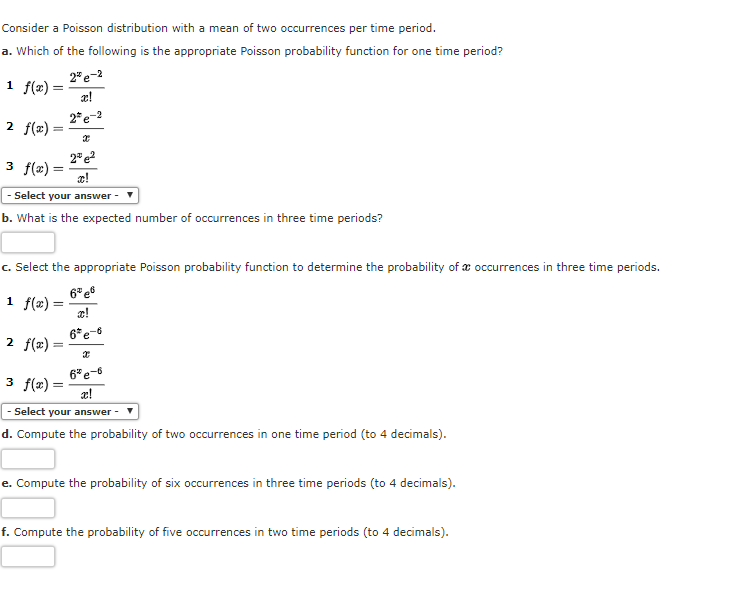Consider a Poisson distribution with a mean of two occurrences per time period. a. Which of the following is the appropriate Poisson probability function for one time period? 2"e-2 1 f(z) = æ! 2*e-2 2 f(x) = 3 f(x) = - Select your answer - b. What is the expected number of occurrences in three time periods? c. Select the appropriate Poisson probability function to determine the probability of æ occurrences in three time periods.
Consider a Poisson distribution with a mean of two occurrences per time period. a. Which of the following is the appropriate Poisson probability function for one time period? 2"e-2 1 f(z) = æ! 2*e-2 2 f(x) = 3 f(x) = - Select your answer - b. What is the expected number of occurrences in three time periods? c. Select the appropriate Poisson probability function to determine the probability of æ occurrences in three time periods.
A First Course in Probability (10th Edition)
10th Edition
ISBN:9780134753119
Author:Sheldon Ross
Publisher:Sheldon Ross
Chapter1: Combinatorial Analysis
Section: Chapter Questions
Problem 1.1P: a. How many different 7-place license plates are possible if the first 2 places are for letters and...
Related questions
Concept explainers
Contingency Table
A contingency table can be defined as the visual representation of the relationship between two or more categorical variables that can be evaluated and registered. It is a categorical version of the scatterplot, which is used to investigate the linear relationship between two variables. A contingency table is indeed a type of frequency distribution table that displays two variables at the same time.
Binomial Distribution
Binomial is an algebraic expression of the sum or the difference of two terms. Before knowing about binomial distribution, we must know about the binomial theorem.
Topic Video
Question

Transcribed Image Text:Consider a Poisson distribution with a mean of two occurrences per time period.
a. Which of the following is the appropriate Poisson probability function for one time period?
2" e-2
1 f(x)=
æ!
2*e-2
2 f(x) :
%3D
3 f(x)=
- Select your answer
b. What is the expected number of occurrences in three time periods?
c. Select the appropriate Poisson probability function to determine the probability of æ occurrences in three time periods.
6" e8
1 f(x) =
x!
6*e-6
2 f(x) =
6*e-6
3 f(x)=
x!
- Select your answer -
d. Compute the probability of two occurrences in one time period (to 4 decimals).
e. Compute the probability of six occurrences in three time periods (to 4 decimals).
f. Compute the probability of five occurrences in two time periods (to 4 decimals).
Expert Solution
This question has been solved!
Explore an expertly crafted, step-by-step solution for a thorough understanding of key concepts.
This is a popular solution!
Trending now
This is a popular solution!
Step by step
Solved in 3 steps

Knowledge Booster
Learn more about
Need a deep-dive on the concept behind this application? Look no further. Learn more about this topic, probability and related others by exploring similar questions and additional content below.Recommended textbooks for you

A First Course in Probability (10th Edition)
Probability
ISBN:
9780134753119
Author:
Sheldon Ross
Publisher:
PEARSON


A First Course in Probability (10th Edition)
Probability
ISBN:
9780134753119
Author:
Sheldon Ross
Publisher:
PEARSON
